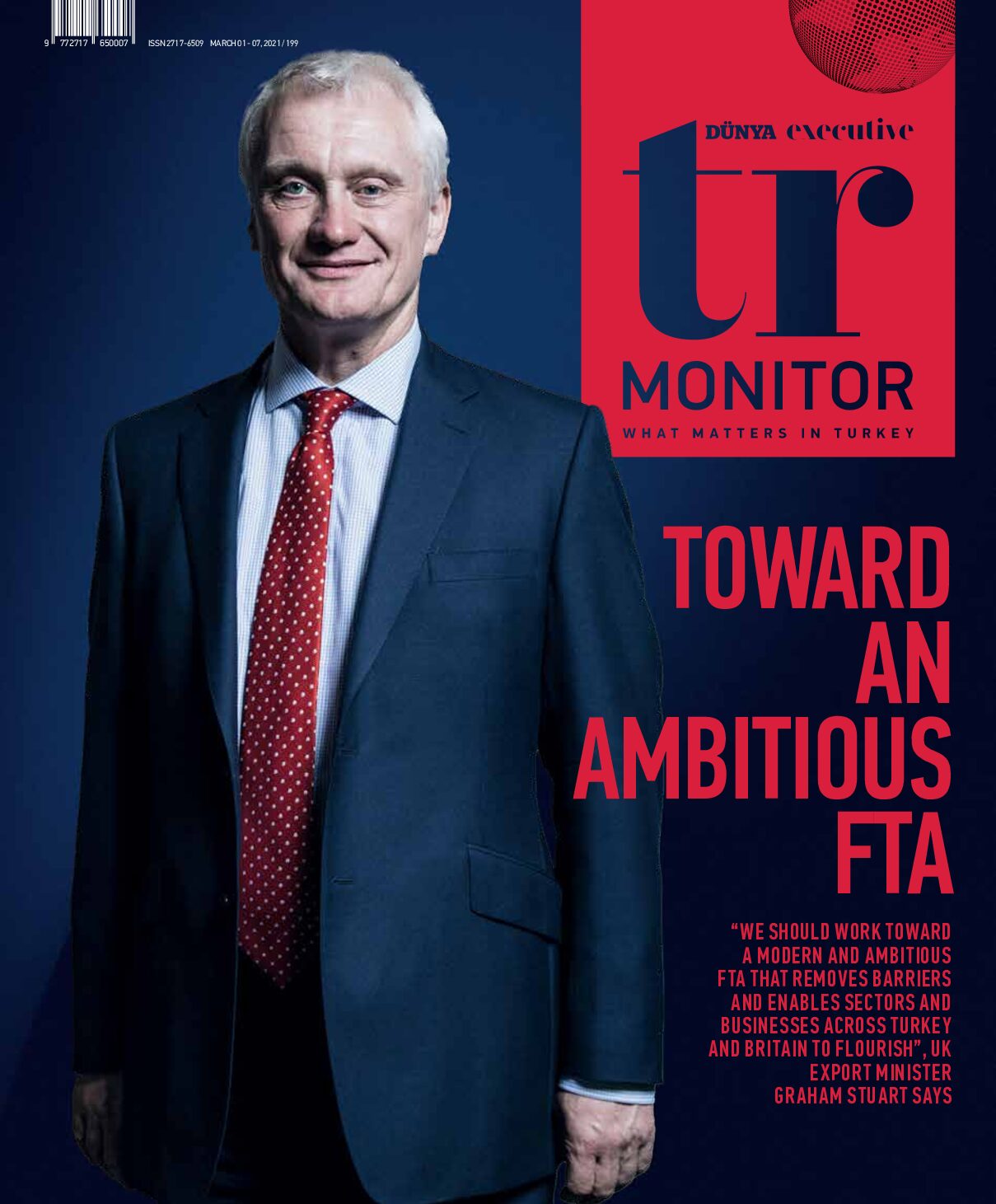By DIDEM ERYAR UNLU
GRAHAM STUART, UK Parliamentary Under- Secretary of State at the Department of State, and its equivalent of an Export Minister, sees the FTA as an important first step in bilateral relations in what he believes should be a concerted effort to work toward a more comprehensive and ambitious FTA in the future. “There will be real opportunities in areas such as services, digital and agriculture,” he says adding that the aim should be to work toward a modern and ambitious FTA that removes barriers and enables sectors and businesses across Turkey and Britain to flourish.
UK is Turkey’s second-biggest export destination after Germany, with a trade volume of USD 26.33bn, making trade relations after Brexit a hot topic for the country. How does Stuart define the new opportunities and new areas of cooperation?
To him, the UK-Turkey commercial relationship fundamental to both countries, accounting for USD 11.14bn of UK exports to Turkey and USD 14.77bn of Turkish exports to the UK. “The close access we have enjoyed to each other’s markets, and the partnerships formed thereof, have delivered huge economic growth to both countries,” he says. “The FTA Britain and Turkey signed in December is therefore a hugely important first step in sustaining and growing UK-Turkey relations following Britain’s departure from the European Union.”
UK Prime Minister Boris Johnson announced a 10-point plan for a Green Industrial Revolution, mobilizing USD 16.71bn of government investments, and potentially three times as much from the private sector, to create and support up to 250,000 green jobs. What would a green recovery mean for Turkey and UK-Turkey relations?
THE UK’S GREEN POLICIES CREATE OPPORTUNITY
“The UK is committed to leading global efforts on climate change, and the economic transition to low-carbon economies. At the end of 2020, the Prime Minister made two very important announcements: the 10-point plan for a Green Industrial Revolution; and a new, independent and ambitious climate target to reduce emissions by at least 68% by 2030, when compared to 1990 levels,” the export minister explains. He sees these policies as an opportunity for UK-Turkey relations. “Turkey is a manufacturing hub, and vital to efforts on renewable energies. Our clean energy plans have similarities, with a focus on offshore wind and emerging technologies such as hydrogen. The Tech Conference is part of our efforts to maximize these relations.”
“The Turkish government has also ambitious plans,” according to Stuart. At the UK Tech Conference, Engin Ilseven, Deputy Head of Energy Affairs at the Ministry of Energy and Natural Resources outlined the Turkish government’s commitment to increase the share of renewables in its energy mix to over 30%, primarily focusing on solar, wind and geothermal. The UK also shared their insights on the future trends for renewable energy. The conference also included a discussion on why the UK is already a world leader in investigating the use of hydrogen for heating, replacing fossil fuels like natural gas with hydrogen and hydrogen blends.
However, it is also important to note that each country’s journey will be different – it is not a case of onesize-fits-all, according to Stuart. “The UK has found that a green recovery makes economic sense, as well as bringing environmental benefits. Turkey has made great strides in many areas, including renewable energies and energy efficiency. We are also seeing the work that is being done on other cleangrowth sectors, such as zero-emission vehicles and the domestic T•GG electric automobile.”
“WELL̞ ESTABLISHED TURKISH BUSINESSES”
Speaking about what makes the two countries attractive for each other in terms of investments and trade, Stuart states that the UK offers the most business-friendly ecosystem in Europe with an outstanding reputation as a place to live and work. “The UK is the world’s sixth largest economy with proven multi-sector infrastructure alongside a significant addressable domestic market,” he says.
He mentions that there has been a long and successful history of inward investment by Turkish tech companies. “The Department of International Trade alone helps around 20 Turkish companies per year, through it’s free services, to set up and grow in the UK,” he notes.
“For Turkish companies, the UK is perceived as an easy market to do business in and there is a well-established Turkish business community. Turkish investors see the UK as a springboard to other markets, such as the European region and North America. They find it easier to access public sector funding opportunities (from UKRI – InnovateUK, Industrial Strategy Challenge Fund), and to raise funding from investors. The UK is also home to world-class talent, skills and education system.”
PARTNERSHIP IN A DIGITALIZED FUTURE
Turkey is attractive to UK companies given its importance as a trading partner, with a large population (80m people) and a healthy appetite for new technologies, according to Stuart. “It is also the gateway to many other markets in the region, including Eastern Europe, Central Asia, the Middle East and North Africa,” he says, adding that Turkey is seen as a mature, serious market, where it is much easier to do business than in some nearby markets.
Looking ahead, “We will also enhance UK-Turkish partnership on the digitalized future of healthcare provisions, and of course, renewable technologies to power our economies with low-carbon fuels,” the minister says. “The Turkish economy will thrive if it can adapt to the new business models of the digital age. By investing now, we can make the most of digital technologies for sustainable future growth, and ensure that both the UK and Turkey remain competitive in the post-pandemic world.”
AREAS OF COLLABORATION IN DIGITALIZATION THAT WILL SUPPORT OTHER INDUSTRIES
“There are two key areas of digitalization, digital manufacturing and smart cities, where we have been focusing on enhanced UK-Turkish partnership,” says Graham Stuart, UK Parliamentary Under-Secretary of State at the Department of State. “We are beginning to look at healthcare, too.”
►Digital Manufacturing: “Turkey has a large manufacturing industry – providing opportunities for companies specializing in the digitization of manufacturing to work together. The UK has a long history of manufacturing dating back to the late 18th century. A strong technology platform and ability to innovate has positioned the UK to specialize in high-tech manufacturing industries such as aerospace and pharmaceuticals. High Value Manufacturing and Digital Catapult centers help UK businesses adopt, develop and exploit innovative products and technologies.”
►Smart Cities: “Turkey has a large urban population and as such faces many of the challenges experienced by cities around the globe. The UK has internationally-recognized strengths in integrating citywide systems around transport, energy and security networks as well as in data and specialist analytics. The UK’s engineering and architectural firms have already used their urban planning and design expertise to create smart cities around the world.”
UK TECH WEEK SUPPORTS THE AMBITIOUS TARGETS OF TURKEY’S NEW ECONOMY PROGRAM
Graham Stuart, UK Parliamentary UnderSecretary of State at the Department of State (Minister for Exports,) was one of the keynote speakers of UK Tech Week, the first B2B and B2G event held after the signing of the Free Trade Agreement in December 2020. The UK Tech Week, Turkey, a three-day conversation, held from February 16-18, 2021 by the UK Department of International Trade in collaboration with the Turkish Ministry for Industry and Technology, was designed to explore how digital and green technologies will be key in the post-Covid-19 recovery. The conference was designed in collaboration with the Turkish Ministry for Industry and Technology in support of the Republic of Turkey’s ‘New Economy Program 2020-22’ – especially the program’s ambitious targets on open data, technological transformation, and high value-added manufacturing. With the UK preparing to host the 26th UN Climate Change Conference (COP26) in Glasgow in November 2021, the program will also turn its attention to how to rebuild economies in a way that reduces carbon emissions. This underpins the key sectoral themes of the conference: digital manufacturing, urban mobility in smarter cities, digital health, and renewables.










